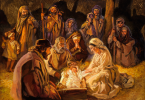
Theme: St. Joseph model of commitment
Scripture Reading: 2 Sam. 7:4-5, 12-14, 16; Ps. 88:2-5, 27, 29; Rom. 4:13, 16-18, 22; Mt. 1:16, 18-21, 24
The humble figure ( of St. Joseph ) which was so near to Jesus and Mary, Christ’s Virgin Mother, he who was so intimately connected with their and so closely linked with the genealogy of the Messiah as to be the fateful and conclusive representative of the descendants of David ( Mt. 1,20 ), is revealed as being full of significance if we look at him attentively….
If we look carefully into this that was apparently so unremarkable, we shall find that is was greater and more adventurous, more full of exciting events, than we are accustomed to assume in our hasty perusal of the Gospel story. The Gospel describes St. Joseph as a just man ( Mt. 1,19 ). No greater praise of virtue and no higher tribute to merit could be applied to a man of humble social condition who was apparently far from being equipped to perform great deeds. A poor, honest, hardworking, perhaps even timorous man, but one with unfathomable interior life, from which very singular directions and consolations came, bringing him also the logic and strength that belong to simple and clear souls, and giving him the power of making great decisions, such as that decision to put his liberty at once at the disposition of the saving designs, to make over to them also his legitimate human calling, his conjugal happiness, to accept the conditions, the responsibility and the burden of a family, but, through an incomparable virginal love, to renounce that natural conjugal love that is the foundation and the nourishment of the family; in this way he offered the whole of his existence in a total sacrifice to the imponderable demand raised by the astonishing coming of the Messiah, to whom he was to give the everlastingly blessed name of Jesus ( Mt. 1,21 ), whom he was to acknowledge as the effect of the Holy Spirit, and his own son only in a juridical and domestic way.
So St. Joseph was a “ committed ” man, we might say nowadays. And what commitment ! Total commitment to Mary, the elect of all the women of the earth and of history, always hai virgin spouse, never his wife physically, and total commitment to Jesus, who was his offspring only by legal discordance, not by the labours surrounding the holy family. His was the service, the work, the sacrifice, in the shadows of that gospel picture in which we love to meditate on him; and we are certainly not mistaken, for we all know him now and call him blessed….
St. Joseph was the type of the message of that Gospel that Jesus was to announce as the programme in the redemption of mankind, once he left the little workshop at Nazareth and began his mission as prophet and teacher. St. Joseph is the model of those humble ones that Christianity raises to great destinies, and he is the proof that Christianity raises to great destinies followers of Christ there is no need of “ great things ”; it is enough to have the common, simple, human virtues, but they need to be true and authentic………..
Let us think again of St. Joseph in his poverty and hard work, all his energy engaged in the effort of earning something to live on, and let us then remember that economic goods are indeed worthy of our Christian interest, on condition that they do not become ends in themselves but are understood and used us means to promote life which is directed towards other and higher goods, on condition that economic goods are not sought after greedy egoism, but rather a source and stimulus of provident charity, on condition again that they used as authorization for soft and easy indulgence in the so-called pleasures of life, but rather of life, but rather used for the broad and honest interests of the common good.
This Saint’s laborious and dignified poverty, can still be an excellent guide for us to follow the path traced by Christ’s footsteps in the modern world, and can also eloquently instruct us in positive and honest well-being, so that we may avoid losing Christ’s path in the complicated and giddy world of economies, to avoid going too far on one side into far on the other side, into making use of poverty for ideological ends, as a power to rouse social hatreds and systematic subversion.
( Paul VI, Homily on the Feast of St. Joseph, 19 March, 1969 )






